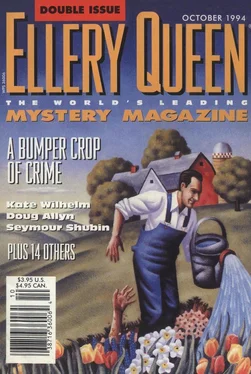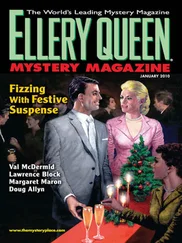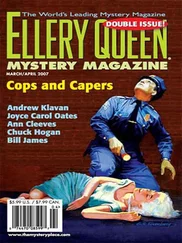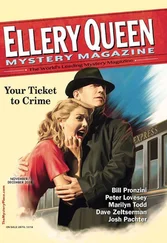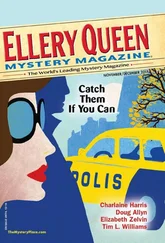Doug Allyn - Ellery Queen’s Mystery Magazine. Vol. 104, No. 4 & 5. Whole No. 633 & 634, October 1994
Здесь есть возможность читать онлайн «Doug Allyn - Ellery Queen’s Mystery Magazine. Vol. 104, No. 4 & 5. Whole No. 633 & 634, October 1994» весь текст электронной книги совершенно бесплатно (целиком полную версию без сокращений). В некоторых случаях можно слушать аудио, скачать через торрент в формате fb2 и присутствует краткое содержание. Город: New York, Год выпуска: 1994, ISBN: 1994, Издательство: Dell Magazines, Жанр: Детектив, на английском языке. Описание произведения, (предисловие) а так же отзывы посетителей доступны на портале библиотеки ЛибКат.
- Название:Ellery Queen’s Mystery Magazine. Vol. 104, No. 4 & 5. Whole No. 633 & 634, October 1994
- Автор:
- Издательство:Dell Magazines
- Жанр:
- Год:1994
- Город:New York
- ISBN:ISSN 1054-8122
- Рейтинг книги:4 / 5. Голосов: 1
-
Избранное:Добавить в избранное
- Отзывы:
-
Ваша оценка:
- 80
- 1
- 2
- 3
- 4
- 5
Ellery Queen’s Mystery Magazine. Vol. 104, No. 4 & 5. Whole No. 633 & 634, October 1994: краткое содержание, описание и аннотация
Предлагаем к чтению аннотацию, описание, краткое содержание или предисловие (зависит от того, что написал сам автор книги «Ellery Queen’s Mystery Magazine. Vol. 104, No. 4 & 5. Whole No. 633 & 634, October 1994»). Если вы не нашли необходимую информацию о книге — напишите в комментариях, мы постараемся отыскать её.
Ellery Queen’s Mystery Magazine. Vol. 104, No. 4 & 5. Whole No. 633 & 634, October 1994 — читать онлайн бесплатно полную книгу (весь текст) целиком
Ниже представлен текст книги, разбитый по страницам. Система сохранения места последней прочитанной страницы, позволяет с удобством читать онлайн бесплатно книгу «Ellery Queen’s Mystery Magazine. Vol. 104, No. 4 & 5. Whole No. 633 & 634, October 1994», без необходимости каждый раз заново искать на чём Вы остановились. Поставьте закладку, и сможете в любой момент перейти на страницу, на которой закончили чтение.
Интервал:
Закладка:
After Frau Hsueh left, my mother sat down and howled. This was quite a sight for us. We had always considered Mother made of cast iron. I only discovered later that she already knew I was headed for internment, and for internees there was neither reeducation nor parole.
The food and cognac was gone.
Adolf Fleischmann turned to me, “You began by saying you enjoyed crime novels.”
“Yes,” I said.
“They don’t seem to have sharpened your wits,” he said. His head was moving round and from side to side. I thought he would have a paroxysm.
“In what way?” I asked.
“There is something wrong with your story,” he said. Actually what he said was, “Zer iss ssomessink wrong mit your history.”
I looked at him uncomprehending.
Herr Pastor said, “I, too, like criminal romances.”
Both looked at me as if I was not very intelligent. Fleischmann half rose from his chair. “Did you know the parties concerned?”
“Well, I knew Marianne,” I said.
“But not even the name of the person who unwrapped the carpet and who must have been an important witness at the trial...”
“Like I told you, Mother forbade any newspapers in the house at the time.”
“Or the lover’s name?”
“Look, this was thirty-five years ago,” I said.
“Let me give you another scenario. Marianne has a lover. He murders his wife for whatever reason. Or she has an accident and he knows nobody will believe him innocent.”
“Yeee...s.”
“He goes to Marianne and says, T did it for you.’ Frau Hsueh had told you Marianne was a... loyal girl? You thought that’s just a mother talking about her daughter. But if Marianne was loyal to her friends...”
“She became a Communist official when it suited her,” I said hotly, watching his head go from side to side in a nervous frenzy.
“Or because she felt the need to evince loyalty. People had failed her, why not a cause!” I felt he was running ahead of himself.
“Or because she wanted to help someone,” said Herr Pastor quietly. “It was very sad here, too.”
“Go on,” I said, ignoring the pastor’s intervention.
“So she arranges for one of her other friends... she had a very wide circle of friends, to employ a euphemism... in your English language also there are many euphemisms... so, she arranges for a friend or lover to dispose of the body. The other lover discovers he is not the only man in her life. She has gone to Tsing Tao for the hot weather...”
“Where’s your evidence?” I challenged him, the usual response from someone caught out with the wrong story.
“Unlike you, I knew the parties. I knew all the parties.”
The movements of his head subsided. He drained at an empty glass nervously, put it down irritably, and rose, first offering a hand to the pastor. He seemed to recollect something, reached into his pocket and handed him a cheque. “This should pay for a headstone. There will be arrangements for flowers.”
He turned to me. All the agitation was now gone from his voice and manner. “And now, will you shake hands with me?”
I went straight to the station and caught a train for Seligenstadt. I had with me a carrier bag full of the latest crime novels for the friends I was staying with. “This time,” I said to them on arrival, “I haven’t just brought you some mystery books, I’ve brought you a real mystery.”
I related my story.
When I left, Gerdi and Reinhard were still arguing whether Fleischmann was the lover or the betrayer and cursing my rotten memory for names.
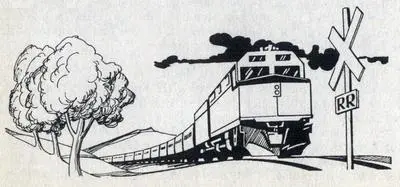
Wild Strawberries
by James A. Ritchie
© 1994 by James A. Ritchie
A self-educated man and a lifelong fan of Louis L’Amour, James Ritchie is primarily a writer of western fiction. His first publication in that field, a short story, appeared in 1980 and was followed by two western novels for Walker and Company. Mr. Ritchie has made his living as a hunter, trapper, construction worker, and farmer; the last of these occupations may explain how he is able to capture so well the atmosphere of the midwest farm town depicted in his new story for us...
Linda had obviously stopped at the supermarket before coming home from work, because when she parked the car in the driveway she honked before coming inside. She only does that when she needs help carrying something. So I went out and helped carry the bags of groceries into the house and set them on the table. Linda dug into one of the bags and came out with a quart of strawberries.
She held the strawberries up and smiled. “I got your favorite,” she said. “I even remembered the whipped cream. Sit down and I’ll fix you a bowl.”
I sat down at the table. Linda put the groceries away, then went to work on the strawberries, slicing the stems free, then halving and washing the berries. She filled a small bowl and squirted a thick pile of whipped cream on top, completely covering the strawberries.
I do love strawberries, but Linda was wrong when she said she had bought my favorite. You can’t buy the strawberries I love at any store. Oh, I can eat store-bought strawberries. I mean, they’re better than no strawberries at all, but that’s about it.
Domestic strawberries aren’t grown for flavor, but for size. Some are the size of a baby’s fist, and because of travel time and shelf time, they have to be harvested long before they fully ripen. Yes, I can eat them, if I have enough whipped cream piled on top, but they leave a lot to be desired.
Wild strawberries are another story. Wild strawberries are small, usually not much bigger than a marble, and when allowed to ripen on the plant, they almost melt in your mouth. Wild strawberries are sweet and so full of flavor they make domestic strawberries fade into nothingness.
I spent the first nineteen years of my life in a tiny farming town in east-central Indiana, population 105. Railroad tracks ran through the exact center of town, passing the large grain elevator where corn and soybeans were loaded into the cars. At harvest time, usually most of October and November, the grain elevator ran day and night, and a freight train came through every couple of hours.
The sound of corn being stripped from the cob and shot down metal pipes into the waiting train cars, the chugging of farm tractors hauling corn and soybeans, the lonesome whistle of train engines, and the follow-the-leader banging as a train started pulling the long line of heavily loaded cars to their destination filled the town of Millville with noise. After a week or so, however, the noise seemed to fade as the ear grew accustomed to it.
I was seventeen, and Julie Craig wasn’t my first girlfriend, but she was the first woman I’d ever made love to. Julie often talked about marriage, but I never took her seriously, and nothing could have been further from my mind. I owned a car, and on Friday or Saturday night we would drive into New Castle, or Hagerstown, and eat at a McDonald’s and then hang out with friends at the bowling alley.
At other times, when the weather was nice, we would walk down the railroad to a woods half a mile from town. There we would picnic next to a small stream. We would talk, make love, pass the day in pleasant companionship.
And we would drink. Like me, Julie was seventeen, but I had a friend who would buy whiskey for us whenever we wanted, and with Julie that was every weekend. And when she drank, it was with the purpose of getting drunk. It was one of the few things I didn’t like about her, especially since I didn’t drink much and hated the feeling of being intoxicated.
Читать дальшеИнтервал:
Закладка:
Похожие книги на «Ellery Queen’s Mystery Magazine. Vol. 104, No. 4 & 5. Whole No. 633 & 634, October 1994»
Представляем Вашему вниманию похожие книги на «Ellery Queen’s Mystery Magazine. Vol. 104, No. 4 & 5. Whole No. 633 & 634, October 1994» списком для выбора. Мы отобрали схожую по названию и смыслу литературу в надежде предоставить читателям больше вариантов отыскать новые, интересные, ещё непрочитанные произведения.
Обсуждение, отзывы о книге «Ellery Queen’s Mystery Magazine. Vol. 104, No. 4 & 5. Whole No. 633 & 634, October 1994» и просто собственные мнения читателей. Оставьте ваши комментарии, напишите, что Вы думаете о произведении, его смысле или главных героях. Укажите что конкретно понравилось, а что нет, и почему Вы так считаете.
